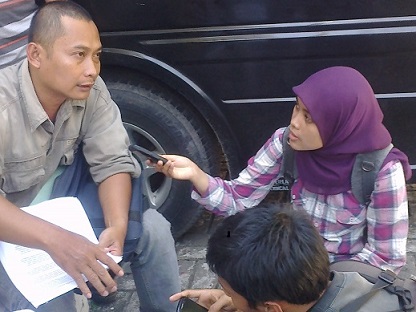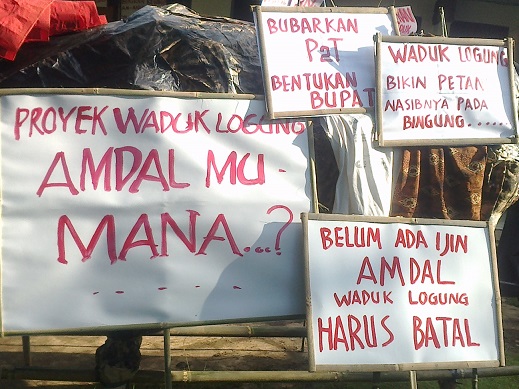The Freedom of Information Act has largely failed to make government institutions more transparent and accountable
Widodo Putro and Ward Berenschot
Protesting against the dam Harjono
In 2011, the village of Kadangmas in Kudus District, East Java, was designated as the site of a large water reservoir. In preparation for its construction, government officials went around the village to compensate local citizens, largely comprised of elderly and illiterate farmers, for the imminent flooding of their land. The price they offered was far below market value. Many people refused. A period of harassment and threats from hired preman, or thugs, followed. After this many people sold their land at a very low price.
When Harjono, a migrant labourer returning home after working elsewhere, saw how his neighbours were being cheated out of a fair price for their land, he decided to write a letter to the local government. He wanted to know which land was expected to be submerged, and what price had been budgeted for the land. He suspected that local government officials had been skimming off money that should have gone to the residents.
A new era of transparency?
Harjono made this request under Indonesia’s Freedom of Public Information Act (Undang Undang Kebebasaan Informasi Publik, or UU KIP). Adopted in 2008 and implemented in 2010, this law obliges all public bodies and government institutions to provide citizens with information about almost every aspect of their operations. The law also set up ‘information commissions’ as appeal bodies, which citizens can turn to if frustrated in their requests. It obliges governments at the district, provincial and national levels to designate staff as information officers, and prescribes penalties for failures to provide requested information. At the time of its adoption, the law was justly celebrated as a major step towards a more transparent and accountable government. During Suharto’s New Order the state had become aloof, corrupt and unresponsive. The new law would, it was hoped, enable citizens to discipline state institutions by bringing malpractices to light.
Five years on, we went to East Java to see the extent to which those hopes have been realised. As we studied local conflicts that involved requests for information, we found that Harjono was not the only one who struggled to put the Freedom of Information Act to use. Hard data is missing: at present none of the responsible government institutions (such as the Central Information Commission, or CIC) seem to collect systematic data on the amounts and types of requests for information brought to information officers. But the five district government information officers that we visited in East Java receive on average 23 requests per year, often from a single requester. As most of Indonesia’s 500-odd districts do not even have an information officer, the total number of requests remains paltry compared to, for example, India, which has 850,000 requests per year. In its four years in operation, the CIC has received only 1195 appeals, while India’s CIC received 33,922 appeals in 2011-12 alone.
Furthermore, even when information officers receive requests, they are often very reluctant to provide the requested information. A nationwide requesting exercise in 2012 found that, without appeal, information officers provided the requested information in only 46 per cent of requests. In our study in East Java we found a response rate of 33 per cent. Most applicants needed to file a least one complaint before getting the information. A 2011 study conducted by the human rights organisation Kontras on the national police found that 68 per cent of the requests did not even receive a response.
Verdicts ignored
This was also Harjono’s experience. After his requests were repeatedly ignored, he decided in February 2011 to pay a personal visit to the district head of Kudus. It was election time. As he brought two journalists in tow, the district head felt sufficiently pressured to provide the official estimates of land values in Kadangmas. The estimates turned out to be almost three times higher than the compensation that had been paid to Harjono’s neighbours, heightening his suspicion that government officials had been pocketing the difference.
To prove his hunch, Harjono, together with the Legal Aid Institute (LBH) in Semarang, asked the district government to provide information about the amount of money that, according to their official accounts, was paid to villagers. The district head refused, considering this to be ‘private information’. This is indeed an exemption mentioned in the law, where vague wording often provides excuses for bureaucrats to deny information requests. But in this case the Act does clarify that the private nature of information cannot be a ground for exemption if affected persons have agreed to disclosure. Yet local information officers decided they could not go against wishes of the district head and denied Harjono’s request.
 Harjono talks with the media Harjono
Harjono talks with the media Harjono
These information officers are part of the local government structure. This greatly reduces their willingness to provide information when it might get their superiors in trouble. Local and provincial governments have been hesitant in appointing information officers and setting up information commissions. According to data from the CIC, in January 2013, only 23 per cent of district governments and 53 per cent of provincial governments had appointed information officers. While the law requires each provincial government to institute an information commission, at present only 23 out of 34 provinces have complied.
Information officers are generally lower-level bureaucrats whose careers depend on support from their superiors. They operate with limited budgets. As a result, local information officers are hardly in a position to persuade their unwilling colleagues that it is their legal obligation to provide certain information. Furthermore, as corruption in government institutions is often carried out collectively, information officers risk triggering widespread indignation and reprisals from their colleagues if they provide sensitive information to the public.
As a result, Harjono decided to make use of the appeal body provided under the freedom of information law. In May 2012, he and his neighbours chartered buses to travel to Semarang to appeal to East Java’s Information Commission. It ruled in their favour, ordering the district government to meet with the farmers and provide the requested information. Yet no sanction was imposed, and the Kudus district government decided to ignore the ruling.
Harjono’s experience points to a key weakness of Indonesia’s Freedom of Information Act. Any ruling of an information commission is not final, as its verdict can be ignored or appealed to the administrative court, which leads to endless delays and basically prevents enforcement of the law. Furthermore, there are no effective penalties for government institutions that fail to provide information. The law does stipulate penalties for both withholding information and misusing government information. In practice, however, information commissions seem reluctant to impose penalties for failure to provide information. When their superiors wish to cover up corruption, it is riskier for individual information officers to provide information than it is to withhold it.
Combatting corruption
For Harjono, the costs and time required for him to pursue the case in court were prohibitive. Instead, he asked both the KPK (Anti-Corruption Commission), and the local prosecutor’s office to try the government officials involved for corruption. But both declined, citing a lack of evidence.
The fate of Harjono’s complaint confirms the general trend. The contribution of the Freedom of Information Act towards combating corruption has been minimal. According to both the CIC and watchdog NGOs like PATTIRO, the wait is still on for a request that succeeds in unearthing enough information to bring a corruption case to court. Attempts by Indonesia Corruption Watch, for example, to obtain information on the spending of government budgets or school operation funds have ended up languishing in the administrative courts.
This is a very sobering result after almost four years of the law being in operation. Repeated failures in court suggest that the provisions of the Act are simply not strong enough to force public bodies to provide incriminating information. It does not need to be so. In India the Right to Information (RTI) Act has led to spectacular court cases and verdicts, and has sparked an anti-corruption movement and a new and successful anti-corruption party, the Aam Admi Party. India’s greater success probably has a lot to do with stronger enforcement capacity. In India the information commission regularly imposes penalties and there are less opportunities to stall requests with appeals.
Given the potential demonstrated in India, and the high hopes that accompanied the passage of Indonesia’s Freedom of Information Act, there are good reasons for the law to be reviewed and ways to strengthen it considered. Such methods might include enabling the information commissions to impose harsher penalties, strengthening the position of information officers, and shortening appeal procedures.
Such a review is needed as there is also a lot to celebrate about the Indonesian law. As we interviewed people who had succeeded in obtaining information, we observed how the mere act of requesting and obtaining information from previously highly secretive state institutions can change previously highly deferential attitudes towards powerholders. Having a right to seek information is creating a sense of empowerment and, sometimes, even enjoyment in such civic acts as engaging with government officials.
Moreover, in most of the cases we studied, the information obtained was not used for litigation, but rather for advocacy and lobbying. Given the widespread distrust of the courts, the process of requesting information was often a goal in itself, as it served to gain media attention for an issue and put pressure on those in power.
A successful request for information sometimes turned people into effective and engaged citizens like Harjono. As one woman who successfully got rid of an illegal telecommunication tower in her neighbourhood explained, ‘we did not just get information, but we started to feel the confidence to question various other activities. After citizens managed to get access to information, government officials no longer dare to give illegal permits to investors. They are also more careful about using development funds since they feel they are being checked by citizens’. That is still the real potential of this law.
Widodo Putro (widodo.fhunram@gmail.com) is Lecturer at Faculty of Law University of Mataram. Ward Berenschot (ward.berenschot@gmail.com) is a researcher at KITLV Leiden working on clientelism and citizenship in Indonesia.












